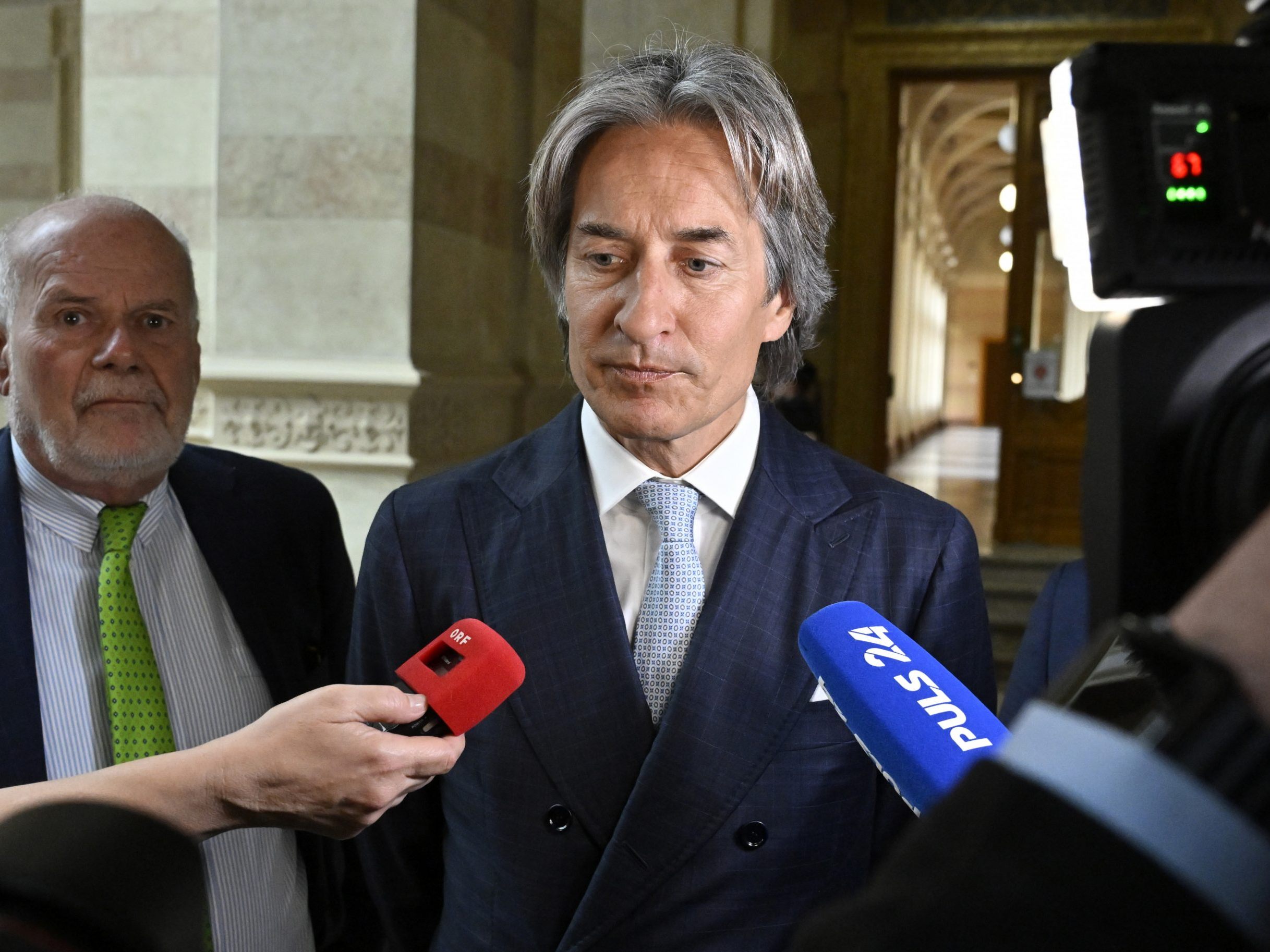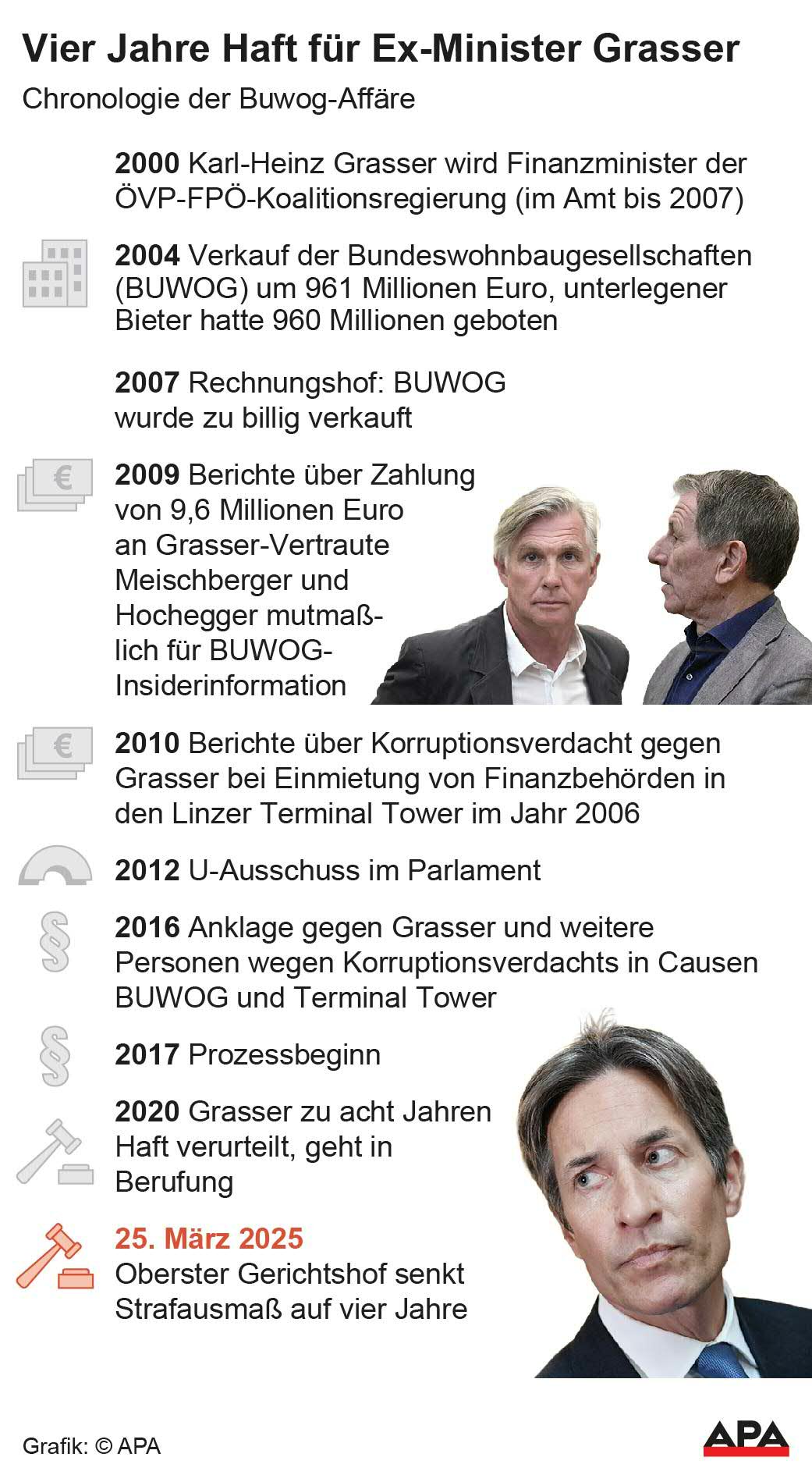OGH Reduces Prison Sentence for Grasser

The Supreme Court (OGH) reduced the prison sentence for former Finance Minister Karl-Heinz Grasser from eight to four years and for former FPÖ General Secretary Walter Meischberger from seven to three and a half years.
Grasser spoke of a miscarriage of justice
Grasser and Meischberger spoke of a miscarriage of justice after the verdict was announced and announced an appeal to the European Court of Human Rights (ECHR) in Strasbourg. For former lobbyist Peter Hochegger, the additional prison sentence was reduced from six to three years, with 2 years suspended. The convicted individuals will soon receive a summons to begin their sentences. The Supreme Court reduced the additional prison sentence for former Immofinanz CEO Karl Petrikovics from two years to 12 months suspended. The allegations against Grasser regarding evidence tampering were dismissed.
Today's decision by the OGH panel of judges marks the conclusion of a real estate deal that has occupied the Republic for 21 years. At that time, around 60,000 federal apartments were sold for 961 million euros to a consortium around Immofinanz, while the losing bidder CA Immo had offered just one million euros less for the apartments. This caused surprise; however, it only became apparent a few years later that this privatization might have been rigged when it became known that two of Grasser's friends - the former lobbyists Meischberger and Hochegger - had pocketed 9.6 million euros in commission from the Immofinanz deal.
Another complex issue in the proceedings was commission payments of 200,000 euros in connection with the leasing of the financial authorities in the Linz Terminal Tower. During the course of the proceedings, further smaller charges related to the Telekom affair were included in the trial.
Duration of proceedings had an impact
The halving of the sentences in the Grasser trial is essentially a result of the long duration of the proceedings, which lasted around 15 years. The previous good character and behavior since the acts in the Buwog and Terminal Tower Linz cases also had a mitigating effect, according to the chairwoman of the OGH panel of judges, Christa Hetlinger. Additionally, the partial media prejudgment and public ridicule of the defendants had a mitigating effect.
However, the imposition of "significantly lower sentences" should in no way trivialize the acts, Hetlinger emphasized; the opposite is true. The actions of the defendants are serious corruption offenses with damages amounting to almost ten million euros. The chairwoman of the panel was particularly critical of Grasser. That a finance minister would enrich himself personally in such a way is "unprecedented" in Austria. This was not expected in Austria and tends to shake the public's trust in politics.
The fact that the defendants exhausted their legal remedies and thus also ensured a long trial duration should not be held against them. Exercising their rights should not be to their disadvantage, emphasized the presiding judge.
For the accused ex-lobbyist Peter Hochegger, his confession should be considered mitigating, and for the co-accused ex-Immofinanz CEO Karl Petrikovics, significant compensation for damages.

OGH Sees No Unfairness
The alleged procedural errors in the initial trial and a bias of the first judge Marion Hohenecker, extensively presented by the defense, do not exist, explained the OGH presiding judge. There was no unfair trial, according to the OGH. The defense had repeatedly criticized the composition of the initial court under Judge Hohenecker as "not neutral" and "biased."
The OGH presiding judge extensively addressed the defense's allegations of bias against the first judge. The behavior of her husband, a judge, is not to be glossed over, but it is not part of the proceedings. The files do not provide any indications that Judge Hohenecker acted in a biased manner. The OGH judicial panel cannot identify any misconduct in the audio recordings in the large jury courtroom of the Vienna Criminal Court.
As presiding judge Hetlinger explained, she had the impression that the defendants thought the OGH would decide on guilt or innocence. However, that is not the case; the OGH is more concerned with whether the initial proceedings were conducted without defects. The presiding judge noted that the defense had focused less on complaints about defects and facts and more on issues such as seating arrangements, live tickers, or audio recordings in the courtroom.
After almost exactly one and a half hours, OGH judge Hetlinger finished her statements, and the representatives of the private parties were referred to the civil law route. Thus, the largest corruption trial of the second republic came to an end.
(APA/Red)
This article has been automatically translated, read the original article here.





